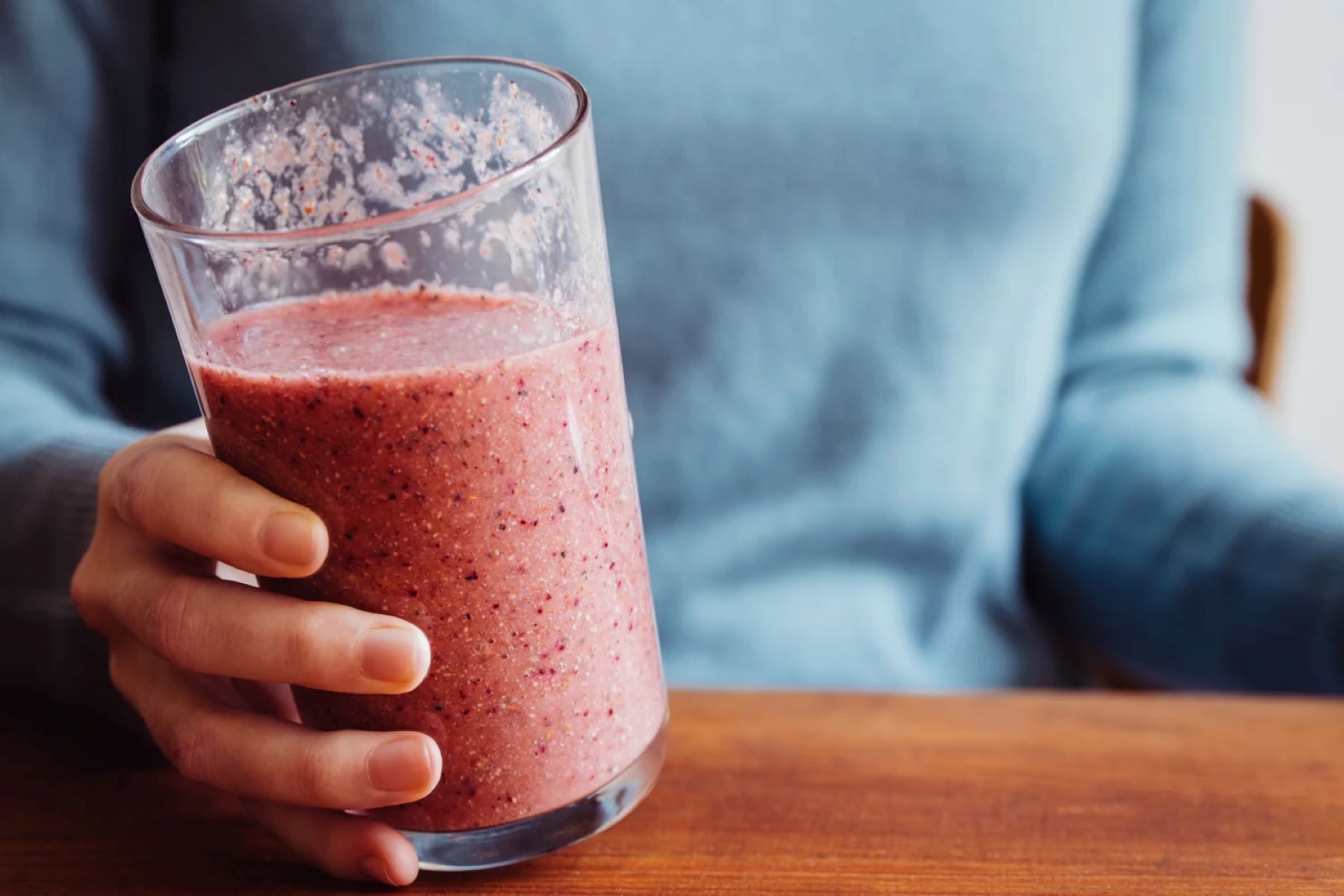Home>Health and Wellness>The Surprising Truth About Liquid Calories


Health and Wellness
The Surprising Truth About Liquid Calories
Published: February 8, 2024
Discover the surprising truth about liquid calories and their impact on health and wellness. Learn how to make informed choices for a healthier lifestyle.
(Many of the links in this article redirect to a specific reviewed product. Your purchase of these products through affiliate links helps to generate commission for Regretless.com, at no extra cost. Learn more)
Table of Contents
Introduction
When it comes to managing our weight and overall health, we often focus on the food we eat and the calories we consume through meals and snacks. However, there is a sneaky culprit that often flies under the radar: liquid calories. These seemingly innocuous beverages can significantly impact our daily caloric intake and, consequently, our health and weight management efforts.
It's easy to overlook the caloric content of drinks, especially when compared to the more tangible act of eating a meal. A quick stop at a coffee shop for a flavored latte, a refreshing soda on a hot day, or a seemingly harmless fruit smoothie can all contribute to our daily calorie intake without us even realizing it. The truth is that liquid calories can add up quickly, and their impact on our health and weight should not be underestimated.
In this article, we will delve into the often overlooked world of liquid calories, exploring their impact on weight and health. We will uncover common sources of liquid calories, shed light on their role in our overall well-being, and provide practical tips for managing our intake. By understanding the surprising truth about liquid calories, we can make informed choices that support our journey towards a healthier lifestyle.
Read more: The Shocking Truth About The Calorie Content Of Supermarket Rotisserie Chicken With Skin!
What Are Liquid Calories?
Liquid calories refer to the energy obtained from beverages that contain sugar, fats, or alcohol. These calories are often overlooked and can significantly contribute to our daily caloric intake. Unlike solid foods, which require chewing and digestion, liquid calories are quickly consumed and digested, leading to a rapid spike in blood sugar levels.
One of the most common sources of liquid calories is sugary drinks, including sodas, energy drinks, and fruit juices. These beverages are often packed with added sugars, which can contribute to weight gain and an increased risk of chronic diseases when consumed in excess. Additionally, alcoholic beverages contain a significant amount of calories, with some cocktails and mixed drinks containing high levels of sugar and fats.
It's important to note that not all liquid calories are unhealthy. For example, milk and plant-based milk alternatives provide essential nutrients such as calcium and vitamin D. However, flavored and sweetened versions of these beverages can also contribute to a high calorie intake.
The liquid form of these calories also means that they may not provide the same level of satiety as solid foods, leading to a potential increase in overall calorie consumption. Furthermore, the body may not register liquid calories in the same way it does solid foods, potentially leading to overconsumption without a corresponding decrease in food intake.
Understanding the nature of liquid calories is crucial for making informed dietary choices. By being mindful of the caloric content of beverages and their potential impact on overall health and weight management, individuals can take proactive steps to monitor and regulate their liquid calorie intake.
The Impact of Liquid Calories on Weight
The impact of liquid calories on weight is often underestimated, yet it plays a significant role in the overall balance of energy intake and expenditure. Unlike solid foods, which can trigger feelings of fullness and satiety due to their physical presence in the stomach, liquid calories may not elicit the same level of satisfaction, leading to potential overconsumption. This lack of satiety can result in individuals unknowingly consuming a surplus of calories, ultimately contributing to weight gain.
Sugary beverages, including sodas, sports drinks, and fruit juices, are among the primary culprits when it comes to liquid calories. These drinks are often laden with added sugars, which not only elevate calorie intake but also pose a risk to metabolic health. The body metabolizes these sugars rapidly, leading to a spike in blood sugar levels and subsequent insulin release. Over time, frequent consumption of sugary beverages can contribute to insulin resistance, weight gain, and an increased risk of obesity-related complications.
Alcoholic beverages also contribute to the liquid calorie conundrum. Cocktails and mixed drinks, in particular, can harbor substantial amounts of hidden calories from added sugars and fats. The body processes alcohol differently from other nutrients, prioritizing its metabolism and potentially storing excess energy as fat. Moreover, the disinhibiting effects of alcohol can lead to poor dietary choices and overeating, further exacerbating the impact of liquid calories on weight.
It's essential to recognize that even seemingly innocuous beverages, such as flavored lattes and smoothies, can pack a caloric punch. These indulgent drinks often contain added sugars, syrups, and high-fat ingredients, contributing to a significant calorie load. When consumed regularly, these liquid treats can tip the scales in favor of weight gain, especially when their caloric content is not offset by adjustments in the rest of the diet.
In the context of weight management, liquid calories warrant careful consideration. Their potential to stealthily contribute to overall energy intake, coupled with their limited ability to induce satiety, underscores the need for mindful consumption. By acknowledging the impact of liquid calories on weight and making informed choices about beverage selection, individuals can better align their dietary habits with their health and wellness goals.
Understanding the intricate relationship between liquid calories and weight underscores the importance of vigilance and moderation in beverage choices. By being attuned to the caloric content of drinks and their potential impact on weight, individuals can take proactive steps to manage their liquid calorie intake and support their overall well-being.
The Role of Liquid Calories in Health
The role of liquid calories in health extends beyond their impact on weight management, encompassing a wide array of physiological and metabolic implications. The consumption of beverages containing significant amounts of calories, particularly from added sugars and fats, can exert far-reaching effects on overall health and well-being.
One of the primary concerns surrounding liquid calories is their potential to contribute to the development and progression of chronic diseases. Sugary drinks, in particular, have been linked to an increased risk of conditions such as type 2 diabetes, cardiovascular disease, and metabolic syndrome. The rapid influx of sugar into the bloodstream following the consumption of these beverages can strain the body's ability to regulate blood sugar levels, potentially leading to insulin resistance and an elevated risk of developing diabetes. Moreover, the inflammatory and oxidative stress-inducing effects of excessive sugar consumption can contribute to cardiovascular complications, underscoring the detrimental impact of liquid calories on heart health.
Alcoholic beverages, another significant source of liquid calories, can also exert profound effects on health. Excessive alcohol consumption is associated with an increased risk of liver disease, gastrointestinal disorders, and certain types of cancer. The metabolic byproducts of alcohol metabolism can induce cellular damage and inflammation, contributing to the development of liver conditions such as fatty liver disease and alcoholic hepatitis. Additionally, the impact of alcohol on nutritional status and the body's ability to absorb essential nutrients further underscores the intricate interplay between liquid calories and overall health.
Furthermore, the consumption of high-calorie beverages can displace nutrient-dense foods from the diet, potentially leading to deficiencies in essential vitamins, minerals, and other micronutrients. This imbalance can compromise immune function, bone health, and overall vitality, highlighting the broader implications of liquid calorie intake on nutritional status and wellness.
By recognizing the multifaceted role of liquid calories in health, individuals can make informed choices that align with their long-term well-being. Understanding the potential impact of sugary and alcoholic beverages on chronic disease risk, metabolic health, and nutritional adequacy underscores the importance of mindful consumption. By prioritizing hydration through low-calorie or calorie-free options such as water, herbal teas, and infused beverages, individuals can mitigate the adverse effects of liquid calories on health and pave the way for a balanced and nourishing dietary approach.
In summary, the role of liquid calories in health extends beyond mere energy intake, encompassing their influence on chronic disease risk, metabolic function, and nutritional balance. By acknowledging the broader implications of beverage choices and their potential impact on health, individuals can take proactive steps to prioritize beverages that support their overall well-being.
Common Sources of Liquid Calories
The landscape of liquid calories is vast and varied, encompassing a plethora of beverages that can stealthily contribute to our daily energy intake. By shedding light on the common sources of liquid calories, individuals can gain a deeper understanding of where these hidden culprits may lurk and make informed choices to support their health and wellness goals.
Sugary Beverages
Sugary beverages, including sodas, sports drinks, and fruit juices, are among the primary contributors to liquid calorie consumption. These drinks often harbor significant amounts of added sugars, which not only elevate their caloric content but also pose a risk to metabolic health. The rapid metabolism of these sugars can lead to a spike in blood sugar levels, potentially contributing to insulin resistance and an increased risk of chronic diseases when consumed in excess.
Alcoholic Beverages
Alcoholic beverages represent another significant source of liquid calories. Cocktails, mixed drinks, and beer can contain substantial amounts of hidden calories from added sugars and fats. The body processes alcohol differently from other nutrients, prioritizing its metabolism and potentially storing excess energy as fat. Moreover, the disinhibiting effects of alcohol can lead to poor dietary choices and overeating, further exacerbating the impact of liquid calories on overall caloric intake.
Flavored Lattes and Specialty Coffees
The allure of flavored lattes, mochas, and specialty coffees often conceals their high caloric content. These indulgent beverages are often laden with syrups, sweeteners, and high-fat ingredients, contributing to a significant calorie load. Despite their liquid form, these coffee concoctions can pack a caloric punch, especially when consumed regularly without consideration for their impact on overall energy balance.
Smoothies and Shakes
While often perceived as a healthier option, smoothies and shakes can also harbor a substantial amount of liquid calories, particularly when they contain added sugars, syrups, or high-fat ingredients. Commercially available smoothies and shakes may also be portioned to contain multiple servings, leading individuals to unknowingly consume a significant amount of calories in liquid form.
Read more: The Shocking Truth About Grilled Cheese Sandwiches: Calorie Count And Health Impact Revealed!
Energy Drinks and Sweetened Teas
Energy drinks and sweetened teas are additional sources of liquid calories that can contribute to an elevated daily caloric intake. These beverages are often marketed for their energizing or refreshing properties, yet their high sugar content can tip the balance in favor of excess calorie consumption, potentially impacting weight management and overall health.
By being mindful of these common sources of liquid calories, individuals can navigate their beverage choices with greater awareness and make informed decisions that align with their health and wellness objectives. Understanding the caloric content and potential impact of these beverages can empower individuals to prioritize hydration through low-calorie or calorie-free options, supporting their journey towards a balanced and nourishing dietary approach.
Tips for Managing Liquid Calorie Intake
-
Prioritize Hydration: Opt for calorie-free or low-calorie beverages such as water, herbal teas, and infused water to quench your thirst without adding significant calories to your daily intake. Keeping well-hydrated supports overall health and can help reduce the temptation to reach for high-calorie drinks.
-
Read Labels: When selecting beverages, take the time to read the nutrition labels. Pay attention to the serving size, total calories, and added sugars. Be mindful of hidden sources of calories in seemingly innocent drinks, such as flavored waters and sports drinks.
-
Limit Sugary Drinks: Cut back on sugary beverages such as sodas, fruit juices, and sweetened teas. Consider diluting fruit juices with water or opting for whole fruits, which provide fiber and essential nutrients alongside natural sugars.
-
Mindful Coffee Choices: When indulging in coffee or specialty drinks, opt for options with minimal or no added syrups and sweeteners. Choose smaller sizes and consider alternatives such as black coffee, espresso, or unsweetened plant-based milks to reduce liquid calorie intake.
-
Homemade Smoothies: If you enjoy smoothies, consider making them at home using whole fruits, vegetables, and unsweetened ingredients. This allows you to control the calorie content and avoid the excess sugars often found in commercially prepared smoothies.
-
Alcohol Awareness: Be mindful of the caloric content of alcoholic beverages and the potential impact on overall energy balance. Opt for lower-calorie options such as light beer or wine spritzers, and practice moderation to manage liquid calorie intake.
-
Portion Control: Be aware of portion sizes when consuming liquid calories. Many oversized beverages served at restaurants and cafes contain multiple servings' worth of calories. Consider sharing a drink with a friend or opting for smaller sizes to manage your intake.
-
Track Your Intake: Keeping a food and beverage diary can provide valuable insight into your liquid calorie consumption. By tracking your beverage choices, you can identify patterns, make adjustments, and maintain awareness of your overall calorie intake.
-
Opt for Unsweetened Options: Choose unsweetened versions of beverages whenever possible. Unsweetened plant-based milks, flavored sparkling water, and unsweetened iced teas offer refreshing alternatives with minimal or no added sugars.
-
Seek Support: If you find it challenging to manage your liquid calorie intake, seek support from friends, family, or health professionals. Sharing your goals and progress with others can provide encouragement and accountability on your journey towards healthier beverage choices.
By implementing these tips and adopting a mindful approach to beverage selection, individuals can proactively manage their liquid calorie intake, support their overall health and wellness, and contribute to their weight management efforts.
Conclusion
In conclusion, the impact of liquid calories on weight and health is a significant yet often overlooked aspect of dietary habits. Beverages containing hidden calories from sugars, fats, and alcohol can stealthily contribute to our daily energy intake, potentially impacting weight management, metabolic health, and overall well-being. The prevalence of sugary drinks, alcoholic beverages, and indulgent coffee concoctions underscores the need for heightened awareness and informed decision-making when it comes to beverage choices.
By recognizing the role of liquid calories in the broader context of nutrition and health, individuals can take proactive steps to manage their intake. Prioritizing hydration through low-calorie or calorie-free options such as water, herbal teas, and infused beverages can support overall health and reduce the temptation to consume high-calorie drinks. Additionally, being mindful of portion sizes, reading nutrition labels, and seeking support when needed are valuable strategies for navigating the landscape of liquid calories.
The multifaceted impact of liquid calories on weight, chronic disease risk, and nutritional balance underscores the importance of making conscious choices that align with long-term health and wellness goals. By implementing practical tips for managing liquid calorie intake, individuals can cultivate a balanced and nourishing approach to beverage consumption, supporting their journey towards a healthier lifestyle.
Ultimately, the surprising truth about liquid calories lies in their potential to influence our dietary habits, energy balance, and overall well-being. By acknowledging their impact and taking proactive measures to manage their intake, individuals can empower themselves to make informed choices that support their health and vitality. Through mindfulness, awareness, and a commitment to balanced beverage choices, individuals can navigate the realm of liquid calories with confidence and contribute to their overall health and wellness.
In the pursuit of a balanced and nourishing lifestyle, understanding and managing liquid calorie intake is a pivotal step towards achieving holistic well-being. By embracing the insights presented in this article, individuals can embark on a journey towards mindful beverage choices, informed dietary habits, and a healthier relationship with liquid calories.













